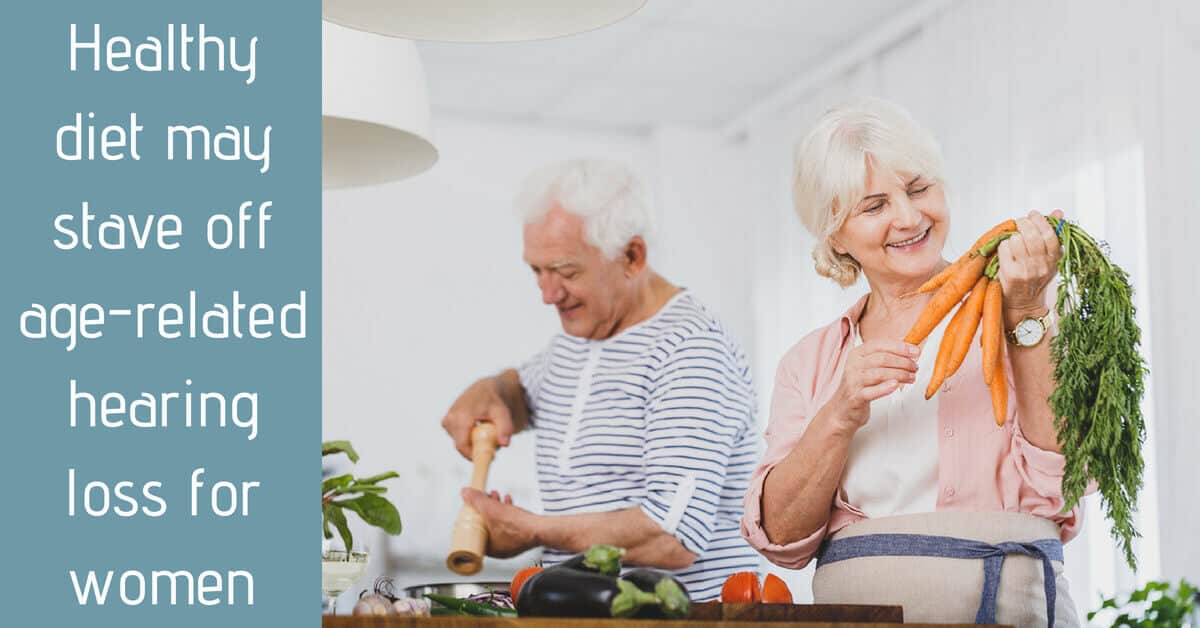You know that your diet is important for your overall health, and to prevent chronic illnesses and diseases. Some foods lower cholesterol levels, control insulin, boost our immune systems, or just make us feel better. But did you know that your diet may be affecting your hearing health as well? In fact, a healthy diet could protect you from age-related hearing loss.
How Diet affects Hearing
A large-scale study of American women collected health data from over 80,000 women between the ages of 25 and 42. They followed up with them every 2 years for 26 years, asking questions about their physical health, wellbeing, and hearing health. They rated the healthiness of the women’s diets based on how closely they followed healthy eating guidelines. They found that those who had the healthiest diets were 47% less likely to develop hearing loss!
Most of us think that hearing loss is an inevitable part of aging. While it is true that as many as half on seniors over the age of 75 have hearing loss, this research suggests that there are ways to keep your hearing sharp, despite your age. Lead researcher Dr. Sharon Curhan from the Brigham and Women’s Hospital and Harvard Medical School in Boston reports that “findings from our research have highlighted a number of dietary factors that can be modified and may reduce the risk of hearing loss.”
Diet can affect your hearing by preserving blood vessel health, lowering blood pressure, and reducing inflammation. Having consistent blood flow to the ears will keep your hearing healthy and prevent damage to the delicate cells of the inner ear. Healthy foods like fruits and vegetables are also full of micronutrients that protect the ear from pathogens. Certain foods can even protect your auditory nerves, helping your brain stay healthy. Your diet affects the health of your body and your blood, which in turn plays a big role in your hearing health.
How to Eat for your Ears
Dr. Curhan’s study found that the healthiest diets for your hearing are the Alternate Mediterranean Diet, and the Dietary Approaches to Stop Hypertension (DASH). Both these diets are high in vegetables, fruits, nuts, legumes, and whole grains, and are low in processed meat, sugar, and salt. The Mediterranean diet advocates eating lots of fish and olive oil, and the DASH promotes low sodium, and high fiber intake.
Minerals: Minerals are important for your overall health, and hearing health. Potassium, for example, regulates the fluids in your body and in your blood. Your inner ear is full of fluid, so potassium keeps your hearing healthy as well. Potassium is found in bananas, melons, and oranges, as well as vegetables like spinach, beans, and tomatoes. Folic acid is another mineral that’s important for your hearing health. It controls new cell growth and promotes great circulation. Get your daily dose of folic acid in dark greens such as spinach, broccoli, and asparagus.
Vitamins: Vitamins play a big role in your health and should be included in every heathy diet. Vitamin C, found in citrus fruits like oranges and kiwis, strengthens your immune system, and helps reduce ear infections, as well as promoting healthy cells in your inner ear. Vitamin E, found in nuts, seeds, spinach, turnips, and kale, has antioxidant properties, and improves circulation. Finally, healthy levels of vitamin B-12 decrease your risk of noise induced hearing loss and lowers your chances of developing tinnitus. Vitamin B-12 is plentiful in most animal products, like beef, seafood, milk, yogurt, and cheese.
My Hearing Centers
Roughly 48 million Americans have hearing loss. Living with untreated hearing loss effects communication, your social life, your ability to perform well at work, and even your safety. You’ll experience reduced cognitive function and worsening productivity, and those with hearing loss are more at risk of social isolation or depression.
We don’t often think about diet when we talk about hearing health, but to keep your body, and your ears, healthy, be mindful of what you’re eating, and make sure to eat a wide variety of healthy foods. If you’ve experienced hearing loss, visit us at My Hearing Centers for a hearing test, and to find the perfect pair of hearing aids for your hearing health.


